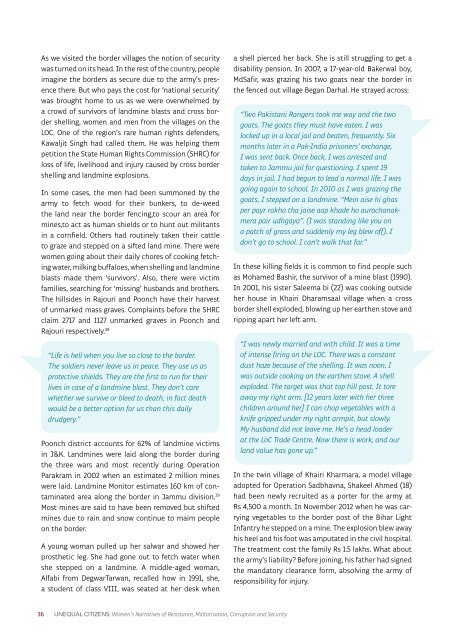CC_India
CC_India
CC_India
Create successful ePaper yourself
Turn your PDF publications into a flip-book with our unique Google optimized e-Paper software.
As we visited the border villages the notion of security<br />
was turned on its head. In the rest of the country, people<br />
imagine the borders as secure due to the army’s presence<br />
there. But who pays the cost for ‘national security’<br />
was brought home to us as we were overwhelmed by<br />
a crowd of survivors of landmine blasts and cross border<br />
shelling, women and men from the villages on the<br />
LOC. One of the region’s rare human rights defenders,<br />
Kawaljit Singh had called them. He was helping them<br />
petition the State Human Rights Commission (SHRC) for<br />
loss of life, livelihood and injury caused by cross border<br />
shelling and landmine explosions.<br />
In some cases, the men had been summoned by the<br />
army to fetch wood for their bunkers, to de-weed<br />
the land near the border fencing,to scour an area for<br />
mines,to act as human shields or to hunt out militants<br />
in a cornfield. Others had routinely taken their cattle<br />
to graze and stepped on a sifted land mine. There were<br />
women going about their daily chores of cooking fetching<br />
water, milking buffaloes, when shelling and landmine<br />
blasts made them ‘survivors’. Also, there were victim<br />
families, searching for ‘missing’ husbands and brothers.<br />
The hillsides in Rajouri and Poonch have their harvest<br />
of unmarked mass graves. Complaints before the SHRC<br />
claim 2717 and 1127 unmarked graves in Poonch and<br />
Rajouri respectively. 28<br />
“Life is hell when you live so close to the border.<br />
The soldiers never leave us in peace. They use us as<br />
protective shields. They are the first to run for their<br />
lives in case of a landmine blast. They don’t care<br />
whether we survive or bleed to death, in fact death<br />
would be a better option for us than this daily<br />
drudgery.”<br />
Poonch district accounts for 62% of landmine victims<br />
in J&K. Landmines were laid along the border during<br />
the three wars and most recently during Operation<br />
Parakram in 2002 when an estimated 2 million mines<br />
were laid. Landmine Monitor estimates 160 km of contaminated<br />
area along the border in Jammu division. 29<br />
Most mines are said to have been removed but shifted<br />
mines due to rain and snow continue to maim people<br />
on the border.<br />
A young woman pulled up her salwar and showed her<br />
prosthetic leg. She had gone out to fetch water when<br />
she stepped on a landmine. A middle-aged woman,<br />
Alfabi from DegwarTarwan, recalled how in 1991, she,<br />
a student of class VIII, was seated at her desk when<br />
a shell pierced her back. She is still struggling to get a<br />
disability pension. In 2007, a 17-year-old Bakerwal boy,<br />
MdSafir, was grazing his two goats near the border in<br />
the fenced out village Began Darhal. He strayed across:<br />
“Two Pakistani Rangers took me way and the two<br />
goats. The goats they must have eaten. I was<br />
locked up in a local jail and beaten, frequently. Six<br />
months later in a Pak-<strong>India</strong> prisoners’ exchange,<br />
I was sent back. Once back, I was arrested and<br />
taken to Jammu jail for questioning. I spent 19<br />
days in jail. I had begun to lead a normal life. I was<br />
going again to school. In 2010 as I was grazing the<br />
goats, I stepped on a landmine. “Mein aise hi ghas<br />
per payr rakha tha jaise aap khade ho aurachanakmera<br />
pair udhgaya”. (I was standing like you on<br />
a patch of grass and suddenly my leg blew off). I<br />
don’t go to school. I can’t walk that far.”<br />
In these killing fields it is common to find people such<br />
as Mohamed Bashir, the survivor of a mine blast (1990).<br />
In 2001, his sister Saleema bi (22) was cooking outside<br />
her house in Khairi Dharamsaal village when a cross<br />
border shell exploded, blowing up her earthen stove and<br />
ripping apart her left arm.<br />
“I was newly married and with child. It was a time<br />
of intense firing on the LOC. There was a constant<br />
dust haze because of the shelling. It was noon. I<br />
was outside cooking on the earthen stove. A shell<br />
exploded. The target was that top hill post. It tore<br />
away my right arm. [12 years later with her three<br />
children around her] I can chop vegetables with a<br />
knife gripped under my right armpit, but slowly.<br />
My husband did not leave me. He’s a head loader<br />
at the LoC Trade Centre. Now there is work, and our<br />
land value has gone up.”<br />
In the twin village of Khairi Kharmara, a model village<br />
adopted for Operation Sadbhavna, Shakeel Ahmed (18)<br />
had been newly recruited as a porter for the army at<br />
Rs 4,500 a month. In November 2012 when he was carrying<br />
vegetables to the border post of the Bihar Light<br />
Infantry he stepped on a mine. The explosion blew away<br />
his heel and his foot was amputated in the civil hospital.<br />
The treatment cost the family Rs 1.5 lakhs. What about<br />
the army’s liability? Before joining, his father had signed<br />
the mandatory clearance form, absolving the army of<br />
responsibility for injury.<br />
36 UNEQUAL CITIZENS: Women’s Narratives of Resistance, Militarisation, Corruption and Security


